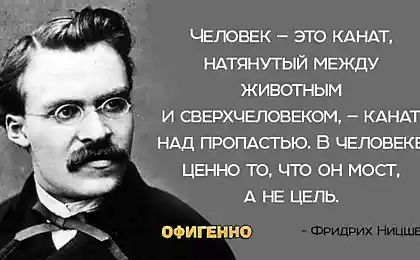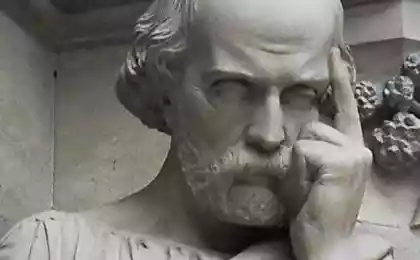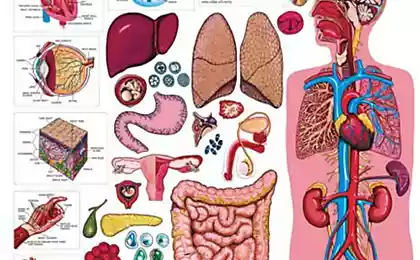884
Health philosophy of Friedrich Nietzsche
I am attracted not so much the health system, much of the philosophical-physiological perception of illness and discomfort as the condition for the growth of the individual as a fulcrum. I think it can inspire many to change, you can accept your illness as a point of reference, as an invaluable experience and a way to overcome. As he wrote to Nietzsche, "the thinker cannot act otherwise how to turn your physical condition in intellektualnaia form — the act of transformation is philosophy."
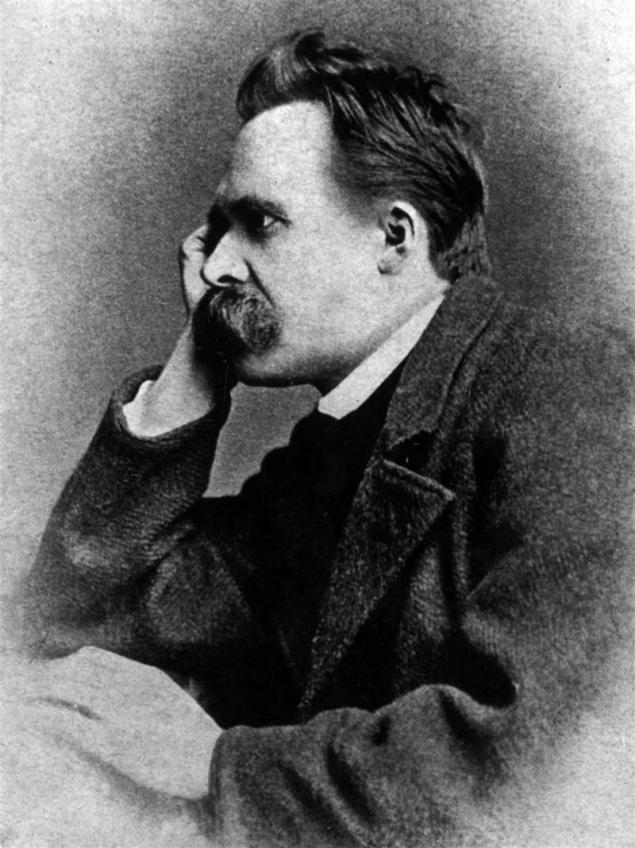
"The cult of suffering, of great suffering — know ye not that only this cult led still man up," when Friedrich Nietzsche said these words, he definitely knew what he was talking about. A great thinker he was doomed to physical and spiritual afflictions all his life. Nietzsche, in fact, was forced to re-make himself. He didn't want to be neither a creature of God nor a functionary of the state nor a "victim" of career Professor. It is believed that the reason was his illness. However, every patient dreams of returning health, and again wants to lead the lifestyle that led him to the disease. Nietzsche embraced the disease as the greatest lesson. The experience of illness he turned into a philosophical method. "Viewed from the perspective of the patient healthier concepts and values, and Vice versa, from the point of view of completeness and self-confidence a richer life look at the mysterious work of the instinct of decadence — that was my long exercise, my actual experience, and if anything, that's the way I became a master. Now I have the experience to move prospects: the main reason why I alone, perhaps, has become generally available to the "revaluation of values". It Friedrich Nietzsche was making a broad generalization about the Association of his genius with the disease, gave his followers reason to believe the genius of disease. Nietzsche expressed this idea as follows: "the Artist give rise to exceptional circumstances, they are deeply related diseases and are associated with them; so, apparently, it is impossible to be an artist and not be sick." The cause of death of Nietzsche is not insanity, and severe hereditary form of temporal-frontal dementia.
"Existence has become for me a painful burden, and I got rid of it, if tormenting disease and the need to limit yourself to absolutely everything and gave me no material for a most instructive experiments and observations of the field of our spirit and morality... the Constant debilitating suffering; the hours-long attacks of faintness, which are for motion sickness; General weakness, almost paralysis, when I feel that my tongue is taken away, and to top it off the severe seizures accompanied by uncontrollable vomiting (last time it lasted three days without a minute of relief. I thought I couldn't stand it. I wanted to die)... what to tell you about this hourly flour, about this ongoing headache about gravity, which crushes my brain and eyes about how all of my body is numb from head to toes!"
Nietzsche is grateful to the disease for participation in its spiritual development, played a crucial role in his life. Doing Philology, performing the duties of a Professor, paying homage to Wagner and Schopenhauer, sharing all these idealistic and romantic views, he, without knowing it, wanted to shy away from their true mission — in hindsight he understands everything happened to him: "Only the sickness brought me to reason"... "Disease is always the answer comes when we want to doubt his right to his task, when we somehow try to make it easier for yourself. It is for our complacency itself we have to pay most severely!"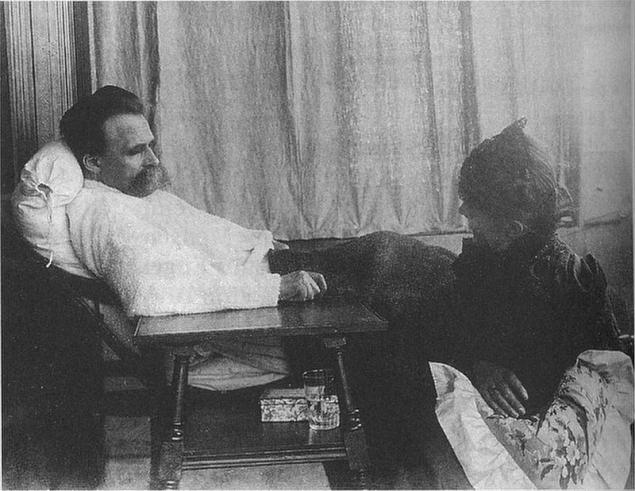
Health concept Nietzsche Nietzsche develops a perspective on health and disease different from the classical philosophical tradition, where health is a harmony of opposites, peace and prosperity. According to the ideas of Nietzsche, health is a dynamic process, the struggle for health, assuming the enemy in the face of illness. The disease is a necessary condition, an element of repulsion, the overcoming and the becoming of health. The human body is the place where you deploy the struggle for health, it is interpreted by Nietzsche as the basis of human individuality, thus, overcome the known object to a person taking place in medicine today.
The importance of the topic of health in the life and philosophy of Nietzsche is his confession: "... I have turned my will to health, my philosophy". Understanding health Nietzsche otherwise. Him the fact that his entire life fell to really fight with is approaching, then retreating disease, health it was impossible to submit without a fight for health. In his interpretation of health is always actively opposed to the destructive power of the disease. We can say that if the ancient approach focused on the result, "health goals", Nietzsche emphasizes in the health of the process of achieving it.
The health of the body is conceived not as the absence of disease case unattainable in reality, but as a measure to which the disease can be tolerated and ultimately overcome. Health is a test of strength, self-surmounting, as a condition of formation and development.
Medicine offered by Nietzsche, does not coincide with conventional wisdom psychotherapy. Its principle is that we must live and not to be treated: healthy life is in absolute solitude, the rejection of the usual conditions of life, care and treatment. Nietzsche writes: "... a good person is pleasant to our external senses; he is carved from wood hard, delicate and fragrant, however. He loves only what is good for him; his pleasure, his desire, ceases when paresthaesia measure useful. He guesses a remedy against the damage, he drew in his favor harmful accident; that he kills makes him stronger. We have to live with their illness. The problem is to live, not to be treated".
"Energy to the absolute loneliness, the rejection of the usual conditions of life, stress over them, in order to take care of themselves, not to serve themselves and not allow themselves to be treated, — all this finds an unconditional instinct, confidence in the understanding of what was then primarily necessary. I took myself in hand, I made myself healthy again: the condition for this — every physiologist to accept this to be the basis of a healthy. Being a typical morbid cannot become healthy, still less make itself healthy; for a typical healthy, on the contrary, the disease may even be an energetic stimulus to life, to life extension. Actually seems to me now this long period of illness: so I re-opened life, turned myself in, I found the taste in all minor things, while others are not easy to find, I have turned my will to health, to life, my philosophy."
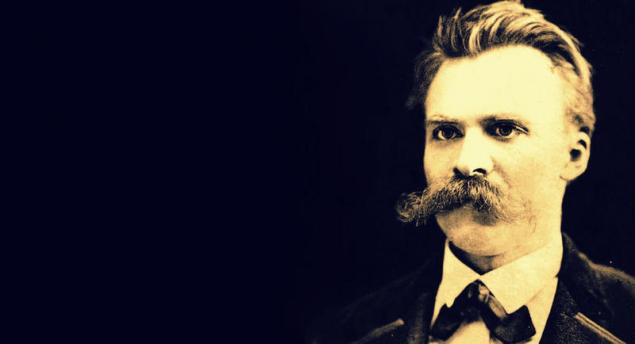
Disease as the key to a healthy Way to cope with the disease through the use of it in any form as an indispensable means of cognition, as a way of overcoming occurs when the disease nihilistic thinking, suggesting, according to Nietzsche, true health, namely: health, which forces them to surrender "at the time of body and soul illness", health, which "can't even do without a disease as a means and ulovlige the hook for learning".
"The one whose soul longs to experience all the old values and aspirations needs to do this in great health in this, which not only have, but also constantly acquires and must acquire, because they always do, have to compromise". Is the health as it includes a disease, it is not capable of becoming a disease does not make this illness a means to achieve himself. The criterion of the health of the spirit is, "a measure of the disease it can take and overcome — by doing well."
So as to genuine health, this path leads only through sickness, Nietzsche, he believes, finds that "it is a painful writers (which includes, unfortunately, almost all great) kept in their writings a much more confident and smooth skin, because it is better to physically strong people understand the philosophy of mental health and recovery". Of these principles of interpretation can be seen as Nietzsche understands his own disease as a symptom of their great all-conquering health.
This is manifested for him first and foremost in its constant will to health. "If you want anything at all to object to the state of the disease against state weakness is the fact that it weakens the actual instinct of healing, and this is the instinct of defense and attack in the man." Nietzsche, taking the disease into their own hands, conscious of her "stubborn will to health": "Go! — I told myself— tomorrow you'll be healthy; today it is enough to pretend to be healthy. The very will to health, acting imitation health was my healing tool".
Naturally, in understanding health, Nietzsche makes a point of struggle, striving, and overcoming. In accordance with the thesis that "the will to power can manifest itself only when counteracted; it is, therefore, looking for someone that can resist it...", your health is unimaginable without a fight for health. For Nietzsche's health and illness do not exist separately from each other. "Consistent with the forms of resistance put up by the well-known force in her quest for power should increase, and the ability to comprehend it in this path of failures and fatal accidents, and since every power can manifest itself only on what resists, in each of our actions must include the ingredient of nedovolstvo.
But this displeasure acts as a new excitement to life and strengthens the will to power!" Thus, first, the disease is a health condition, as to health to be, we must start from the disease, to resist; and second, health and disease appear as active dynamic processes. As an obstacle and resistance "...the disease may even be an energetic stimulus to life, to life extension...". In this regard, the new lights the role of disease in human life. It is an essential component of human life. In another context and on another occasion Nietzsche wrote: "...the misconception is, perhaps, generally a necessary condition for observation".
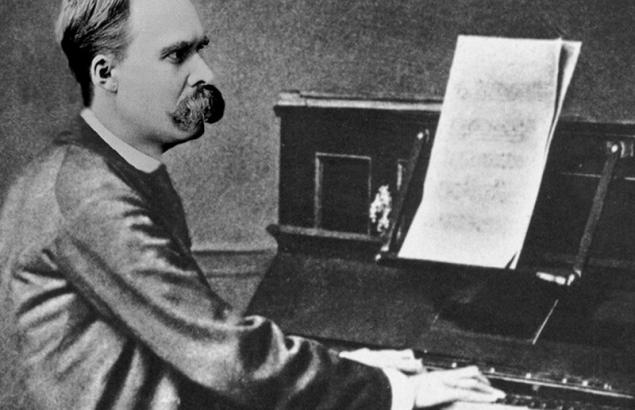
The need for illness to manifest health Using these words to disease and health, can be considered a disease a necessary condition for human health. The disease is not something that should be avoided, but what is the necessity you should worry, and maybe, as in the case of Nietzsche, to turn the disease into a positive basis of life and creativity. Purification of the soul from all evil was deeply alien to him: free from suffering, grief, death — stop life. The body is the mover of life, embodying the "will to power", the excess force. Nietzsche writes: "Finally, this leaves open a large question: whether we can dispense with disease even for the development of our virtue, and you do not need a sick soul, not less healthy, in our thirst for knowledge and self-knowledge: in short, is it not extraordinary will to health a prejudice, cowardice, and perhaps some semblance of utonchennaya barbarism and backwardness".
Its task Nietzsche was to present the disease as active, interpretive force, acting with the necessary basis of life and health. Health Nietzsche stands as the goal, the ideal to which you strive, for which you need to fight. In fact, we are dealing with the struggle for health. But the struggle is necessary assumes the opposite direction illness pathology. Thus, the dialectics of health and illness manifested in the fact that pathology is potentially enabling human health. "If you want to argue anything against the illness condition, against state weakness is the fact that it weakens the actual instinct of healing, and this is the instinct of defense and attack in the man."
What Nietzsche wrote about the body as individual bodies, talking about his health, Nietzsche says: "Health in itself does not exist, and all attempts to define such a thing over the deplorable failure. To determine what is actually means health for your body, it is necessary to reduce the question to your goal, your horizon, your powers, your affections, your delusions, and especially to the ideals and chimeras in your soul. Therefore, there are countless health of the body, and more than once again allow rare and unique to raise his head, the more otoshibuta from the dogma of the "equality of people", the sooner should disappear from our doctors, the concept of a normal health, along with normal diet and normal course of disease". Unity and struggle: illness and health Concepts of disease and health appear in front of Nietzsche in a strange ambiguity: illness supported by actual health (health of the inner world, or existence) and being in his service, is itself a symptom of this health. Health in the medical sense, peculiar besubstantially essence, becomes a symptom of the actual disease. Such interchangeability of the words "healthy" and "sick" entails an apparent contradiction in the judgments of Nietzsche, which speak equally strongly against the satisfaction of their own health in favor of the values of the disease, and against all that is painful in favor of health.
Again and again he scornfully opposed to the stupidity of those, who feeling in himself health, turns away from all alien to them: "poor things, they never suspect what a deadly paleness resting on their health, how ghostly it looks," he gives a description of the methods of the Philistines from education who "invent for their habits, attitudes, likes and dislikes are valid in all cases, the formula of "health" and eliminate any inconvenient troublemaker, suspecting him of pain and eccentricity".
In this regard, Nietzsche says: "this is the fatal fact that "spirit" with a special hunt appears commonly in "patients and futile"". These statements must not be misleading regarding the fact that the whole philosophy of Nietzsche, as he thinks, is directed against the disease for health, and that he seeks to overcome all painful. This contradiction becomes, again, due to the fact that the word "health" has different meaning.
This meaning, as recognized by Nietzsche, multivalued not by accident. "Health in itself does not exist... to determine what is actually means health for your body, it is necessary to reduce the question to your goal should disappear the concept of normal health. Of course, the health of one could look like here as the opposite of health in another."
"Don't even think that, say, health is a kind of solid purpose...".
"Health and disease does not represent something significantly from each other differ. No need to make them of different principles or entities. in fact, between these two kinds of existence, there is only a difference in degree."
Thus, Nietzsche in his existential interpretation is defining the idea of health having no biological or medical rationale and focused on the value of a man according to his rank in the existential whole. Only in this sense, acquire the contents of those amazing arguments that Nietzsche seizes as if his illness: it is given to her, he stops her, he overcomes it. It can be traced in detail.
The disease, no matter how it manifested itself, for Nietzsche, is always uncertain in its meaning. It all depends on what to do with it existence: "Illness is a clumsy attempt to recover: we have through the spirit come to the aid of nature". Therefore, Nietzsche again and again interprets his ongoing illness, and as if he had to overcome: he kind of puts it to his service, knows its danger and takes the top, if not above it, above these dangers.
The disease posed to Nietzsche, he believes, is not only made possible the originality of his new thinking: "Disease has given me right to a perfect revolution in my habits. She gave me a forced inaction, idleness, for waiting and patience... But it also means to think!"..., but she was a means of experience and observation. He tells his doctor that "it is in this state of suffering had made instructive experiments, and set up the experiments in the spiritual and moral field: the joy thirst for knowledge takes me to that height where I win all the flour and hopelessness" and in Ecce homo he recalls:
"Among the tortures three days of continuous headaches, accompanied by painful vomiting with mucus, I had a clear dialectic par excellence, very calmly thinking about things for which in healthier circumstances is not found in itself sufficient refinement and tranquility, not to be found daring climber".
In the end, he began to perceive the disease as the impetus that sent him, freed from all external well-established highlights, all about idealistic snoozeville that doesn't need religion and art, on a path where it became really depend only on himself: "with regard to suffering and Forbearance, my life of recent years can compare to the life of any ascetic who ever lived... Just completely alone for the first time allowed me to open my own additional resources."
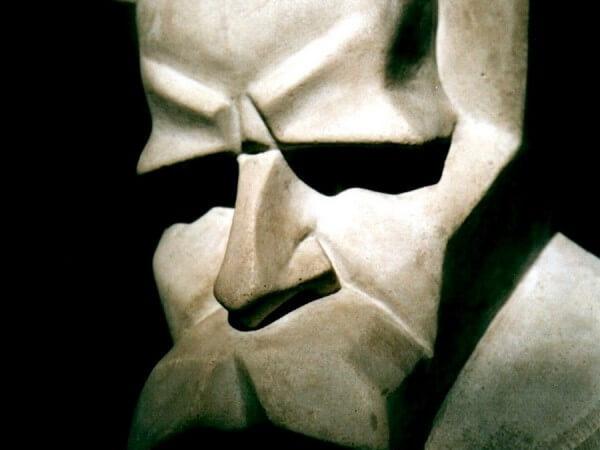
ConclusionHealth is a way to cope with the disease through the use of it in any form as. Recovery, health means more than achieving the normal life state, not just turning, but something infinitely greater: it's the climb, the elevation and the refinement of disease out of the man “with the increased sensitivity of the skin, with a sophisticated touch, with a keen for the pleasures of taste, with a more tender tongue for good things with more cheerful feelings and with a new, more dangerous inexperience in the enjoyment of” childish and naive at the same time, a thousand times more sophisticated than ever.
And this is the second health, standing behind the disease, not blindly accepted, and passionately through suffering, forcibly ripped out, hundreds of gasps and screams bought this “conquered, tortured” health a thousand times of life than the dull complacency is always a healthy person. And he who has once tasted the quivering sweetness, prickly hops such recovery, burning desire to experience it again; he again and again thrown into the fiery stream of burning sulfur, blazing torment to once again achieve “enchanting feelings of well-being” gold intoxication, which Nietzsche a thousand times sweeter than regular stimulants – nicotine and alcohol.
Also interesting: the Philosophy of changing the world
Nikolai Amosov about health, conditions and restrictions
Friedrich Nietzsche was not only stoically follow their own call amor fati, but to transform the suffering into a source of higher spiritual activity. Zarathustra — the human reaction to fate, the pain, the endless suffering. Nietzsche is deeply imbued with the mystical idea of suffering nandinii path to understanding the higher truths of existence. Only when he reached the point of extreme exhaustion, the mystic is able to find a source of release and comfort.
One of the discoveries of Nietzsche: pain, suffering, do not leave the ascetic right to lose. Even the weakness of human is to be converted to power — the power of the spirit.published
Author: Andrey Blueskin P. S. And remember, just changing your mind — together we change the world! ©
Source: www.beloveshkin.com/2016/11/filosofiya-zdorovya-fridrikha-nicshe.html

"The cult of suffering, of great suffering — know ye not that only this cult led still man up," when Friedrich Nietzsche said these words, he definitely knew what he was talking about. A great thinker he was doomed to physical and spiritual afflictions all his life. Nietzsche, in fact, was forced to re-make himself. He didn't want to be neither a creature of God nor a functionary of the state nor a "victim" of career Professor. It is believed that the reason was his illness. However, every patient dreams of returning health, and again wants to lead the lifestyle that led him to the disease. Nietzsche embraced the disease as the greatest lesson. The experience of illness he turned into a philosophical method. "Viewed from the perspective of the patient healthier concepts and values, and Vice versa, from the point of view of completeness and self-confidence a richer life look at the mysterious work of the instinct of decadence — that was my long exercise, my actual experience, and if anything, that's the way I became a master. Now I have the experience to move prospects: the main reason why I alone, perhaps, has become generally available to the "revaluation of values". It Friedrich Nietzsche was making a broad generalization about the Association of his genius with the disease, gave his followers reason to believe the genius of disease. Nietzsche expressed this idea as follows: "the Artist give rise to exceptional circumstances, they are deeply related diseases and are associated with them; so, apparently, it is impossible to be an artist and not be sick." The cause of death of Nietzsche is not insanity, and severe hereditary form of temporal-frontal dementia.
"Existence has become for me a painful burden, and I got rid of it, if tormenting disease and the need to limit yourself to absolutely everything and gave me no material for a most instructive experiments and observations of the field of our spirit and morality... the Constant debilitating suffering; the hours-long attacks of faintness, which are for motion sickness; General weakness, almost paralysis, when I feel that my tongue is taken away, and to top it off the severe seizures accompanied by uncontrollable vomiting (last time it lasted three days without a minute of relief. I thought I couldn't stand it. I wanted to die)... what to tell you about this hourly flour, about this ongoing headache about gravity, which crushes my brain and eyes about how all of my body is numb from head to toes!"
Nietzsche is grateful to the disease for participation in its spiritual development, played a crucial role in his life. Doing Philology, performing the duties of a Professor, paying homage to Wagner and Schopenhauer, sharing all these idealistic and romantic views, he, without knowing it, wanted to shy away from their true mission — in hindsight he understands everything happened to him: "Only the sickness brought me to reason"... "Disease is always the answer comes when we want to doubt his right to his task, when we somehow try to make it easier for yourself. It is for our complacency itself we have to pay most severely!"

Health concept Nietzsche Nietzsche develops a perspective on health and disease different from the classical philosophical tradition, where health is a harmony of opposites, peace and prosperity. According to the ideas of Nietzsche, health is a dynamic process, the struggle for health, assuming the enemy in the face of illness. The disease is a necessary condition, an element of repulsion, the overcoming and the becoming of health. The human body is the place where you deploy the struggle for health, it is interpreted by Nietzsche as the basis of human individuality, thus, overcome the known object to a person taking place in medicine today.
The importance of the topic of health in the life and philosophy of Nietzsche is his confession: "... I have turned my will to health, my philosophy". Understanding health Nietzsche otherwise. Him the fact that his entire life fell to really fight with is approaching, then retreating disease, health it was impossible to submit without a fight for health. In his interpretation of health is always actively opposed to the destructive power of the disease. We can say that if the ancient approach focused on the result, "health goals", Nietzsche emphasizes in the health of the process of achieving it.
The health of the body is conceived not as the absence of disease case unattainable in reality, but as a measure to which the disease can be tolerated and ultimately overcome. Health is a test of strength, self-surmounting, as a condition of formation and development.
Medicine offered by Nietzsche, does not coincide with conventional wisdom psychotherapy. Its principle is that we must live and not to be treated: healthy life is in absolute solitude, the rejection of the usual conditions of life, care and treatment. Nietzsche writes: "... a good person is pleasant to our external senses; he is carved from wood hard, delicate and fragrant, however. He loves only what is good for him; his pleasure, his desire, ceases when paresthaesia measure useful. He guesses a remedy against the damage, he drew in his favor harmful accident; that he kills makes him stronger. We have to live with their illness. The problem is to live, not to be treated".
"Energy to the absolute loneliness, the rejection of the usual conditions of life, stress over them, in order to take care of themselves, not to serve themselves and not allow themselves to be treated, — all this finds an unconditional instinct, confidence in the understanding of what was then primarily necessary. I took myself in hand, I made myself healthy again: the condition for this — every physiologist to accept this to be the basis of a healthy. Being a typical morbid cannot become healthy, still less make itself healthy; for a typical healthy, on the contrary, the disease may even be an energetic stimulus to life, to life extension. Actually seems to me now this long period of illness: so I re-opened life, turned myself in, I found the taste in all minor things, while others are not easy to find, I have turned my will to health, to life, my philosophy."

Disease as the key to a healthy Way to cope with the disease through the use of it in any form as an indispensable means of cognition, as a way of overcoming occurs when the disease nihilistic thinking, suggesting, according to Nietzsche, true health, namely: health, which forces them to surrender "at the time of body and soul illness", health, which "can't even do without a disease as a means and ulovlige the hook for learning".
"The one whose soul longs to experience all the old values and aspirations needs to do this in great health in this, which not only have, but also constantly acquires and must acquire, because they always do, have to compromise". Is the health as it includes a disease, it is not capable of becoming a disease does not make this illness a means to achieve himself. The criterion of the health of the spirit is, "a measure of the disease it can take and overcome — by doing well."
So as to genuine health, this path leads only through sickness, Nietzsche, he believes, finds that "it is a painful writers (which includes, unfortunately, almost all great) kept in their writings a much more confident and smooth skin, because it is better to physically strong people understand the philosophy of mental health and recovery". Of these principles of interpretation can be seen as Nietzsche understands his own disease as a symptom of their great all-conquering health.
This is manifested for him first and foremost in its constant will to health. "If you want anything at all to object to the state of the disease against state weakness is the fact that it weakens the actual instinct of healing, and this is the instinct of defense and attack in the man." Nietzsche, taking the disease into their own hands, conscious of her "stubborn will to health": "Go! — I told myself— tomorrow you'll be healthy; today it is enough to pretend to be healthy. The very will to health, acting imitation health was my healing tool".
Naturally, in understanding health, Nietzsche makes a point of struggle, striving, and overcoming. In accordance with the thesis that "the will to power can manifest itself only when counteracted; it is, therefore, looking for someone that can resist it...", your health is unimaginable without a fight for health. For Nietzsche's health and illness do not exist separately from each other. "Consistent with the forms of resistance put up by the well-known force in her quest for power should increase, and the ability to comprehend it in this path of failures and fatal accidents, and since every power can manifest itself only on what resists, in each of our actions must include the ingredient of nedovolstvo.
But this displeasure acts as a new excitement to life and strengthens the will to power!" Thus, first, the disease is a health condition, as to health to be, we must start from the disease, to resist; and second, health and disease appear as active dynamic processes. As an obstacle and resistance "...the disease may even be an energetic stimulus to life, to life extension...". In this regard, the new lights the role of disease in human life. It is an essential component of human life. In another context and on another occasion Nietzsche wrote: "...the misconception is, perhaps, generally a necessary condition for observation".

The need for illness to manifest health Using these words to disease and health, can be considered a disease a necessary condition for human health. The disease is not something that should be avoided, but what is the necessity you should worry, and maybe, as in the case of Nietzsche, to turn the disease into a positive basis of life and creativity. Purification of the soul from all evil was deeply alien to him: free from suffering, grief, death — stop life. The body is the mover of life, embodying the "will to power", the excess force. Nietzsche writes: "Finally, this leaves open a large question: whether we can dispense with disease even for the development of our virtue, and you do not need a sick soul, not less healthy, in our thirst for knowledge and self-knowledge: in short, is it not extraordinary will to health a prejudice, cowardice, and perhaps some semblance of utonchennaya barbarism and backwardness".
Its task Nietzsche was to present the disease as active, interpretive force, acting with the necessary basis of life and health. Health Nietzsche stands as the goal, the ideal to which you strive, for which you need to fight. In fact, we are dealing with the struggle for health. But the struggle is necessary assumes the opposite direction illness pathology. Thus, the dialectics of health and illness manifested in the fact that pathology is potentially enabling human health. "If you want to argue anything against the illness condition, against state weakness is the fact that it weakens the actual instinct of healing, and this is the instinct of defense and attack in the man."
What Nietzsche wrote about the body as individual bodies, talking about his health, Nietzsche says: "Health in itself does not exist, and all attempts to define such a thing over the deplorable failure. To determine what is actually means health for your body, it is necessary to reduce the question to your goal, your horizon, your powers, your affections, your delusions, and especially to the ideals and chimeras in your soul. Therefore, there are countless health of the body, and more than once again allow rare and unique to raise his head, the more otoshibuta from the dogma of the "equality of people", the sooner should disappear from our doctors, the concept of a normal health, along with normal diet and normal course of disease". Unity and struggle: illness and health Concepts of disease and health appear in front of Nietzsche in a strange ambiguity: illness supported by actual health (health of the inner world, or existence) and being in his service, is itself a symptom of this health. Health in the medical sense, peculiar besubstantially essence, becomes a symptom of the actual disease. Such interchangeability of the words "healthy" and "sick" entails an apparent contradiction in the judgments of Nietzsche, which speak equally strongly against the satisfaction of their own health in favor of the values of the disease, and against all that is painful in favor of health.
Again and again he scornfully opposed to the stupidity of those, who feeling in himself health, turns away from all alien to them: "poor things, they never suspect what a deadly paleness resting on their health, how ghostly it looks," he gives a description of the methods of the Philistines from education who "invent for their habits, attitudes, likes and dislikes are valid in all cases, the formula of "health" and eliminate any inconvenient troublemaker, suspecting him of pain and eccentricity".
In this regard, Nietzsche says: "this is the fatal fact that "spirit" with a special hunt appears commonly in "patients and futile"". These statements must not be misleading regarding the fact that the whole philosophy of Nietzsche, as he thinks, is directed against the disease for health, and that he seeks to overcome all painful. This contradiction becomes, again, due to the fact that the word "health" has different meaning.
This meaning, as recognized by Nietzsche, multivalued not by accident. "Health in itself does not exist... to determine what is actually means health for your body, it is necessary to reduce the question to your goal should disappear the concept of normal health. Of course, the health of one could look like here as the opposite of health in another."
"Don't even think that, say, health is a kind of solid purpose...".
"Health and disease does not represent something significantly from each other differ. No need to make them of different principles or entities. in fact, between these two kinds of existence, there is only a difference in degree."
Thus, Nietzsche in his existential interpretation is defining the idea of health having no biological or medical rationale and focused on the value of a man according to his rank in the existential whole. Only in this sense, acquire the contents of those amazing arguments that Nietzsche seizes as if his illness: it is given to her, he stops her, he overcomes it. It can be traced in detail.
The disease, no matter how it manifested itself, for Nietzsche, is always uncertain in its meaning. It all depends on what to do with it existence: "Illness is a clumsy attempt to recover: we have through the spirit come to the aid of nature". Therefore, Nietzsche again and again interprets his ongoing illness, and as if he had to overcome: he kind of puts it to his service, knows its danger and takes the top, if not above it, above these dangers.
The disease posed to Nietzsche, he believes, is not only made possible the originality of his new thinking: "Disease has given me right to a perfect revolution in my habits. She gave me a forced inaction, idleness, for waiting and patience... But it also means to think!"..., but she was a means of experience and observation. He tells his doctor that "it is in this state of suffering had made instructive experiments, and set up the experiments in the spiritual and moral field: the joy thirst for knowledge takes me to that height where I win all the flour and hopelessness" and in Ecce homo he recalls:
"Among the tortures three days of continuous headaches, accompanied by painful vomiting with mucus, I had a clear dialectic par excellence, very calmly thinking about things for which in healthier circumstances is not found in itself sufficient refinement and tranquility, not to be found daring climber".
In the end, he began to perceive the disease as the impetus that sent him, freed from all external well-established highlights, all about idealistic snoozeville that doesn't need religion and art, on a path where it became really depend only on himself: "with regard to suffering and Forbearance, my life of recent years can compare to the life of any ascetic who ever lived... Just completely alone for the first time allowed me to open my own additional resources."

ConclusionHealth is a way to cope with the disease through the use of it in any form as. Recovery, health means more than achieving the normal life state, not just turning, but something infinitely greater: it's the climb, the elevation and the refinement of disease out of the man “with the increased sensitivity of the skin, with a sophisticated touch, with a keen for the pleasures of taste, with a more tender tongue for good things with more cheerful feelings and with a new, more dangerous inexperience in the enjoyment of” childish and naive at the same time, a thousand times more sophisticated than ever.
And this is the second health, standing behind the disease, not blindly accepted, and passionately through suffering, forcibly ripped out, hundreds of gasps and screams bought this “conquered, tortured” health a thousand times of life than the dull complacency is always a healthy person. And he who has once tasted the quivering sweetness, prickly hops such recovery, burning desire to experience it again; he again and again thrown into the fiery stream of burning sulfur, blazing torment to once again achieve “enchanting feelings of well-being” gold intoxication, which Nietzsche a thousand times sweeter than regular stimulants – nicotine and alcohol.
Also interesting: the Philosophy of changing the world
Nikolai Amosov about health, conditions and restrictions
Friedrich Nietzsche was not only stoically follow their own call amor fati, but to transform the suffering into a source of higher spiritual activity. Zarathustra — the human reaction to fate, the pain, the endless suffering. Nietzsche is deeply imbued with the mystical idea of suffering nandinii path to understanding the higher truths of existence. Only when he reached the point of extreme exhaustion, the mystic is able to find a source of release and comfort.
One of the discoveries of Nietzsche: pain, suffering, do not leave the ascetic right to lose. Even the weakness of human is to be converted to power — the power of the spirit.published
Author: Andrey Blueskin P. S. And remember, just changing your mind — together we change the world! ©
Source: www.beloveshkin.com/2016/11/filosofiya-zdorovya-fridrikha-nicshe.html




